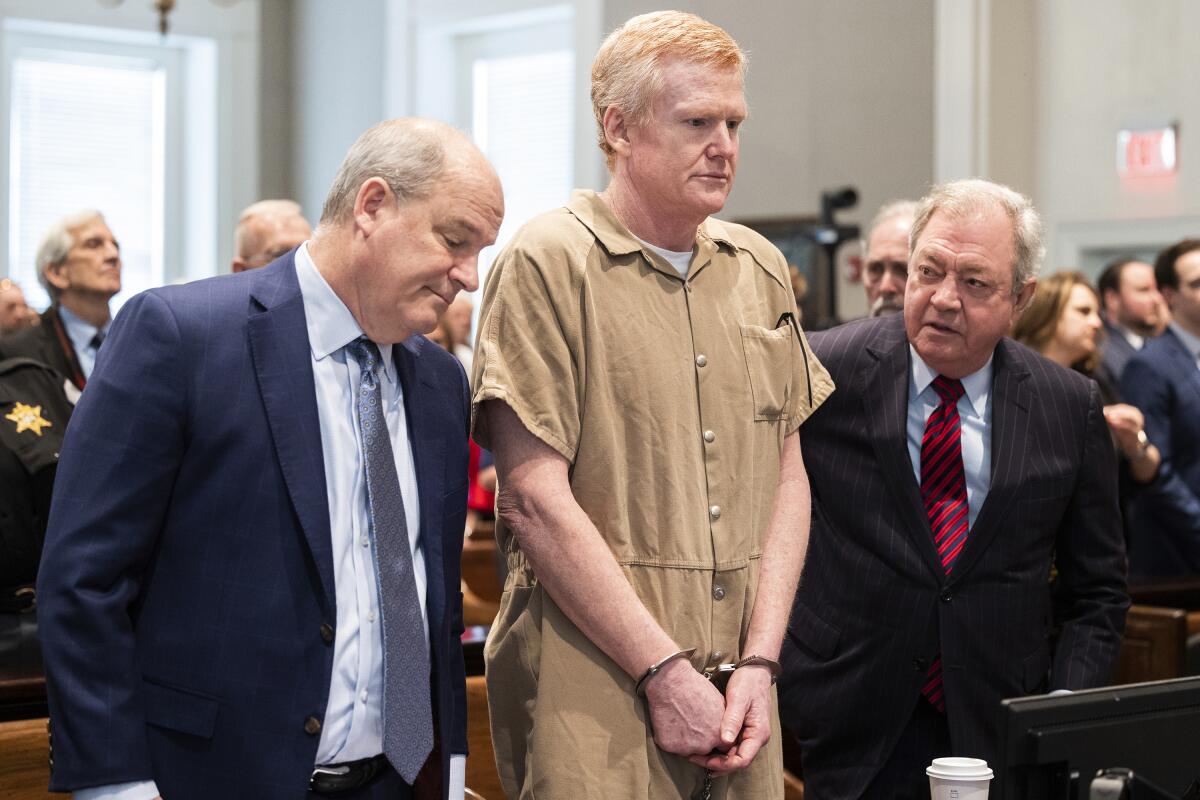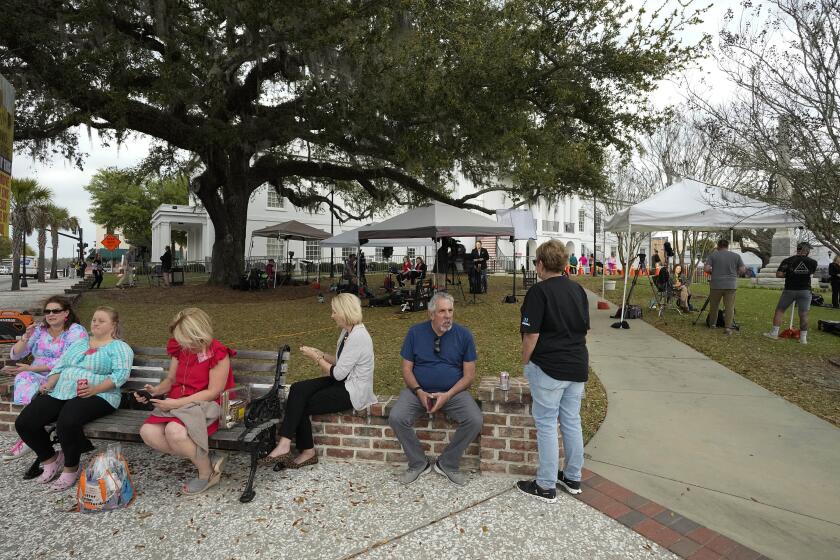Column: Why was the Murdaugh murder trial captivating for so many?

Here in Los Angeles, thousands of miles from South Carolina, the obsession with the double-murder saga of the Murdaugh family has seemed slightly ridiculous to me.
Cable TV news channels pumped up interest, treating it as the trial of the century, as if proceedings against Alex Murdaugh, charged with murder in the shooting deaths of his wife, Maggie, and young adult son Paul, could recapture the ratings “magic” of the O.J. Simpson trial.
The Simpson case, which launched a thousand legal pundit careers, was a nation-jarring collision of race, celebrity, privilege and spectacularly over-the-top courtroom theatrics. Because of this — and the insanely slow-speed white Bronco chase that preceded Simpson’s arrest in the death of his ex-wife Nicole Brown Simpson and her friend Ron Goldman — many Americans with absolutely no personal connection to the Simpson case had a deep emotional investment in its outcome.
But none of that applied to the Murdaugh trial, which featured an unsympathetic defendant, the scion of a South Carolina legal dynasty, who was a confessed drug addict and had admitted pocketing millions of dollars in judgments owed to his clients.
I turned on CNN one recent evening and saw host Laura Coates presiding over a sort of mock trial, with lawyer commentators sitting as prosecutors, defense attorneys and jurors. Ugh. I didn’t even realize the corrosive Nancy Grace was still on TV until I saw a clip of her on Fox News spewing sensational theories about the Murdaugh case.
To me, Alex Murdaugh, who was found guilty on Thursday and sentenced Friday to two consecutive life terms in prison, seemed guilty from the get-go. I didn’t see much suspense there.
The South Carolina jury quickly found Alex Murdaugh guilty of two murder counts after a six-week trial that detailed the once-prominent lawyer’s fall from grace.
And the theatrical strand of mucus hanging untouched from his nose as he wept on the witness stand a couple of weeks ago only reinforced my impression that his profession of innocence was an act. A normal person would have wiped his nose.
Jurors agreed that Murdaugh was acting.
“Yeah,” juror Gwen Generette said Monday on NBC’s “Today” show about Murdaugh’s crying. “It wasn’t genuine.”
After a six-week trial, she and her fellow jurors took a mere three hours to pronounce him guilty. Big shock, I thought dryly. Several said they concluded he was guilty because his voice was heard on Paul’s cellphone video recorded at the family’s kennels minutes before Paul and Maggie were shot. Murdaugh had sworn he had not been on the premises, then later confessed he’d lied about that because his opioid addiction made him paranoid.
Three jurors say Alex Murdaugh didn’t help himself by testifying in his own defense against charges he murdered his wife and son.
It wasn’t until after the sentencing that TV clued me in on why the Murdaughs were so compelling. I watched Netflix’s three-part docuseries on the family. The tale of the Murdaughs may not have the racial or celebrity components of the Simpson case, but who doesn’t love a story about the mighty falling under the weight of their own misdeeds, about powerful people behaving so very badly?
“They were the law in this area,” local reporter Michael DeWitt told the documentary makers Jenner Furst and Julia Willoughby Nason in Netflix’s “The Murdaugh Murders: A Southern Scandal.” “And at times, they were above the law.” (HBO Max aired its own documentary, “Low Country: The Murdaugh Dynasty” in November.)
For generations, the Murdaughs embodied the privileged white justice system in rural South Carolina. They straddled the system, as prosecutors and as plaintiffs’ attorneys. The family owned the largest law firm in the area. They were cozy with law enforcement.
By the time the current youngest generation was old enough to get into trouble, the stench of entitlement had permeated the family. Paul may have come to a grotesque end at the hands of his father at age 22, but he’d already played a part in the death of a classmate. Mallory Beach was 20 years old when she was thrown from his speedboat as he drunkenly piloted it home from a bar in 2019. Four other passengers survived; two of them were seriously injured.
At the time of his murder, Paul was awaiting trial on three felony counts of boating under the influence in connection with Beach’s death. He was never arrested, never handcuffed and never jailed for his role in the horrific crash. State and local police at the crash scene didn’t administer a sobriety test. (The hospital did, and found the 19-year-old’s blood alcohol level was 0.28, more than three times the legal limit.)
Alex Murdaugh’s trial for the murder of his wife and son drew intense public attention; the case spawned true crime series. A jury found him guilty Thursday.
His father and grandfather showed up at the hospital where his seriously injured friends were being treated and, according to the young crash victims in the documentary, tried to get them to lie about who was driving the boat when it crashed, and exhibited no concern for their well-being, nor even for the life of Beach, whose body was recovered from the water eight days after the crash.
That’s not the end of it. This family’s gothic history groans under its head-spinning weight.
In 2015, a high school friend of Buster, Alex and Maggie’s elder (and now only surviving) son, was found dead on an isolated road. Stephen Smith’s death was ruled a hit and run, but authorities have now reopened the case based on evidence they discovered in the course of the Maggie and Paul murder investigation.
In 2018, the family’s longtime housekeeper, Gloria Satterfield, died after falling down steps at the family hunting lodge, tripped by their dogs, the Murdaughs said. Alex engineered a multimillion-dollar insurance payout meant for Satterfield’s sons but has been charged with keeping most of it for himself.
Three months after his son and wife died, Murdaugh is alleged to have conspired with one of his former clients to shoot him and kill him, making it look like a random crime so his surviving son could collect $10 million in insurance. Alex has been charged in that case with conspiracy and filing a false police report.
The more I learn about the trail of devastation left in the South Carolina Low Country by one powerful family, the more I understand the public’s fascination. Very few families are tied to this much pain and anguish. It is the stuff of nightmares — and blockbuster TV.
More to Read
A cure for the common opinion
Get thought-provoking perspectives with our weekly newsletter.
You may occasionally receive promotional content from the Los Angeles Times.















